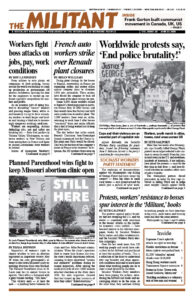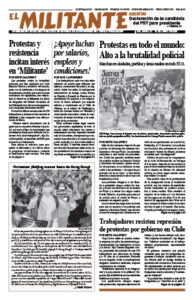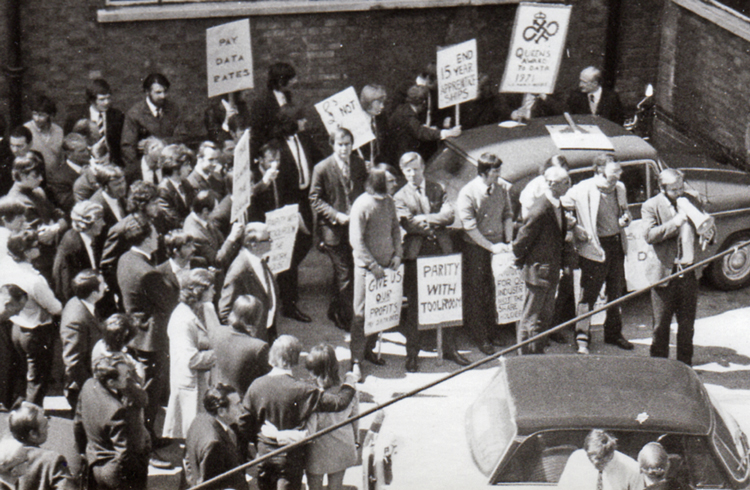MONTREAL — The political activity and contributions of Frank Gorton, a 56-year cadre of the world communist movement, were celebrated here at a May 31 event sponsored by the Communist League.
Gorton dedicated his life to building communist parties in Canada, the United Kingdom, and the U.S. He died in Toronto March 30 at age 79.
The 33 participants came from Montreal, Hamilton and Toronto. They included Frank’s lifelong companion, Toni Gorton, also for many decades a party member and now active supporter of the communist movement. Others who would have liked to come from the U.S., the U.K., or elsewhere were denied the opportunity by a ban on foreign travelers imposed by Canada’s rulers.
Many sent messages, including Jack Barnes, national secretary of the Socialist Workers Party in the U.S., Jonathan Silberman for the Communist League in the U.K., and the leaderships of Communist Leagues in Australia and New Zealand.
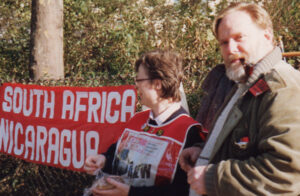
The messages were bound together under the title, “Frank Gorton — proletarian internationalist.” This fact was exemplified by a photo of Gorton from the Facebook page of The Greater Toronto Kurdish House showing him participating in a Toronto demonstration supporting the Kurdish people’s historic struggle for a homeland.
“The man was always there with us and supporting our Nation’s cause by participating in our protesting and marching activities,” the group wrote.
This was also stressed by Silberman in his message on behalf of the CL in the U.K., who worked with Gorton for years there. “That’s how I remember Frank: as a political worker-Bolshevik and internationalist,” Silberman said, “deeply immersed in proletarian party-building at home, a course which he carried out inseparably with collaborating with forces to forge parties around the world and the international communist movement.”
Speaking at the meeting, chaired by Michel Prairie and conducted in both French and English, were Communist League executive committee members Beverly Bernardo, Félix Vincent Ardea and CL organizer Steve Penner. Excerpts from messages were read throughout the program.
Joining the communist movement
When Gorton was born in a working-class district of London in 1940 during the second imperialist war, Penner said, Britain was being hit daily by bombing runs from Berlin. “He and his mother were placed under the delivery table by nurses to protect them. Frank, with his well-known sense of humor, always said that experience marked his personality for the rest of his life.”
Gorton began his political activity when he was in school, initiating a fund campaign for refugees from Hungary after the Stalinist regime in Moscow sent troops to crush the 1956 revolutionary uprising by workers there. After graduating and apprenticing as an engineer for five years, he emigrated to Canada in 1964.
“Frank met the League for Socialist Action, then the section of the Fourth International in Canada and a predecessor of the Communist League, at a large anti-Vietnam War meeting at Massey Hall in downtown Toronto,” Bernardo told the meeting.
“LSA member Toni Foster (now Gorton) sold him a copy of the party’s paper, Workers Vanguard. He joined soon after and became involved in party work in the Fair Play for Cuba Committee defending the Cuban Revolution. He was also active in the growing movement against the Vietnam War and Ottawa’s complicity with Washington’s warmakers, and in other political and union struggles.
Party building in United Kingdom
In 1967 Frank and Toni moved to the U.K. to help build what became the International Marxist Group, the section of the Fourth International there. Frank got a job in Nottingham as a draftsman at the Raleigh bicycle factory.
“There’s a photo of Frank in the display booklet with a bullhorn at a Raleigh workers demonstration during their successful struggle for wage parity for the factory workers,” Penner said. “This was the kind of thing Frank loved to do. And he was good at it.”
The Gorton house became an organizing center for the anti-Vietnam War movement. “Toni and Frank were members of the National Council of the Vietnam Solidarity Campaign, which organized two mass anti-war marches in London, one of 100,000 and another of 200,000, in 1968,” said Penner. Gorton also joined in the party’s solidarity efforts with the Irish struggle against the U.K.’s ongoing colonial rule in Northern Ireland.
For some two decades, Gorton helped lead a political struggle for a proletarian orientation in the party in the U.K. He and other IMG members advocated a program and course of conduct in continuity with the world communist movement founded at the initiative of V.I. Lenin and the Bolshevik leadership of the October 1917 revolution in Russia.
Among other issues, this involved a political fight against the call on revolutionaries to orient to prolonged guerrilla war in Latin America. This disastrous course, adopted by a majority at a 1969 Fourth International congress, was extended to ultraleft policies by parties in Europe and beyond.
Gorton and other IMG cadres also fought to implement a turn to the industrial unions initiated by the SWP leadership and adopted in 1979 by the Fourth International. This course, presented in the new book The Turn to Industry by Jack Barnes, aims to meet growing opportunities to be part of struggles around wages and job conditions, building the unions and winning workers to the party. To help lead the turn, Gorton quit his draftsman’s job and took one on the factory floor.
Gorton knew these struggles were accompanied by new openings to expand circulation of revolutionary literature among workers and other exploited producers. During the 1984-85 strike by more than 100,000 coal miners against the drive of the Margaret Thatcher government to bust their union, Penner said, “Frank took the responsibility to organize party book tables at miners’ rallies all across the country.”
In his message celebrating Gorton’s contributions, SWP leader Jack Barnes said that “Frank was a big help to me in understanding more concretely the evolution over the past several decades in the class composition of the Labour Party membership and leadership.”
In the 1980s, leaders of the former IMG, renamed the Socialist League, had sent members into the Labour Party on what proved to be a wrong assessment it would be a central arena for working-class political activity.
But Gorton, by then a member of a Labour Party club in a more and more middle-class part of London, told Barnes that Labour was well on the way “to no longer being a party whose members in the main were miners, dock workers, engineers and other wage workers, organized in a structured way through their unions. It was increasingly a party of middle-class professionals, better-off office and ‘tech’ workers, teachers, and so on.”
Barnes continued: “‘The new leaders are simply radicals,’ Frank said. ‘You’ll someday be seeing a new Labour Party leadership unlike anything in the history of the workers movement in the U.K.’” And he was right.
Expelled by Socialist League leaders after winning a majority in the organization, communists who were determined to build a party in the U.K. that was working class in program, composition, and habits, founded the Communist League in 1988. Frank and Toni were among them. Frank was elected to the Central Committee.
The Montreal meeting also paid tribute to two other decadeslong communist workers who recently died: Alan Harris, a cadre since 1955 in both Canada and the U.K., who collaborated with Gorton for many years; and 55-year-long SWP cadre Cheryl Goertz in the U.S.
Joining party print shop in U.S.
In 1990 Frank and Toni Gorton were released by the Communist League to spend time in the U.S., where they helped lead the movement’s print shop in New York.
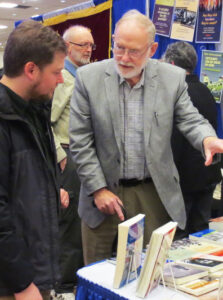
In her greetings, Holly Harkness, who worked in the shop at the time and now organizes Pathfinder’s book distribution, pointed to the stress of meeting tight deadlines for commercial customers. “Luckily, we had people like Frank, who took it all in stride and never lost sight of the reason for the shop in the first place — a print shop for producing the party’s publications.”
After he left the shop, Gorton helped build SWP branches in Newark and Detroit, joining trade union fractions in auto, garment and meatpacking. He was a worker-correspondent for the Militant, covering working-class struggles wherever he lived.
Frank and Toni moved to Toronto in 2000 and became part of the supporters auxiliary of the Communist League. Frank engaged in political activity and took on tasks alongside volunteers the world over who produce Pathfinder books, making it possible for the party to introduce its program to workers and youth.
“As a supporter, Frank continued to be drawn to the League’s participation in union battles,” Bev Bernardo told participants. “He loved being with fighting workers, and they appreciated having him there.”
Félix Vincent Ardea described how he and several others involved in the massive 2012 Quebec student strike were won to the Communist League, the kind of proletarian party Gorton dedicated his life to building.
“Frank set the same example set by Cuban revolutionaries,” said Ardea. “That working people can transform ourselves and accomplish great things, as we organize collectively to fundamentally change the society in which we live.
“If, like me, you are attracted to the political course Frank Gorton followed throughout his life, then join the Communist League and help build the party we need today as we face the deepest capitalist crisis since the 1930s depression.”
“I was happy to be at this celebration,” Ahmed Garbaya, a delivery driver and student, told the Militant at the meeting. “The internationalism of the Communist League is very striking to me. And the best thing about it was the number of committed young people here who are ready to pick up the torch and wage the fight against capitalism.”
Chairperson Michel Prairie invited everyone to join with the Communist League in a demonstration to protest the cop killing of George Floyd in the U.S. later that day.
He appealed to participants to celebrate Frank Gorton’s life by contributing to a special party-building fund. A total of 2,060 Canadian dollars was raised ($1,500).
